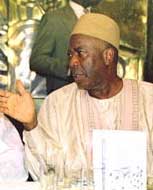Ahmed Tejan Kabbah

Lawyer Leads Troubled Sierra Leone
by David Johnson |
 President Kabbah. (Source/AP) If Kabbah is able to bring peace to this battered this West African land, and help forge lasting democratic institutions, it will cap a lifetime of public service and devotion to the law. Related Links |
Although he took office in 1996 with 60 percent of the vote to become Sierra Leone's first democratically elected president, Ahmed Tejan Kabbah has never been in total control of the whole country.
Nevertheless, if Kabbah is able to bring peace to this battered this West African land, and help forge lasting democratic institutions, it will cap a lifetime of public service and devotion to the law.
Early Years
An ethnic Mandingo, Kabbah was born in Pendembu in the Kallahun District in North Central Sierra Leone on Feb. 19, 1932. After attending St. Edward's Secondary School in Freetown, Kabbah moved to Great Britain where he earned a B.A. and law degree from University College of Wales in Aberyswyth. He subsequently became a lawyer.
In 1959, Kabbah became a district commissioner for the British colonial government in Sierra Leone. He continued working for the government after Sierra Leone gained its independence in 1961. Kabbah later became a permanent secretary, a position he was to hold until 1969.
A U.N. Official
In 1970 and 1971, Kabbah maintained a private law practice. But he returned to public service in 1971 when he went to New York to work for the United Nations Development Program, UNDP. He stayed with UNDP until 1992, including stints representing the agency in the southern African nation of Lesotho, and in Tanzania. When Kabbah left the U.N., he was director of the division for administrative and management services at UNDP.
Sierra Leone's Tumultuous Politics
In 1992, Kabbah became chairman of the National Advisory Council of the Sierra Leone Government. Running as candidate of the People's Party, Kabbah was elected president in 1996.
Ousted by a violent military coup in 1997, Kabbah spent ten months in exile before a Nigerian-led coalition of West African troops, ECOMOG, returned him to power in March, 1998. Since then, Kabbah's government has not had much influence beyond the capital, Freetown. Several rebel groups, especially the powerful Revolutionary United Front, have dominated large sections of Sierra Leone, since the vicious civil war broke out in 1991.
A Fragile Peace in 1999
A fragile peace was finally reached in July 1999, but was marred by fighting and the taking of some 500 U.N. peacekeepers hostage.
Kabbah's wife, Patricia died in 1998. An ethnic Mende, she was a retired U.N. employee. The couple had several children.
Sources: Embassy of Sierra Leone to the U.S., Panafrican News Agency, BBC, Washington Post, africana.com







